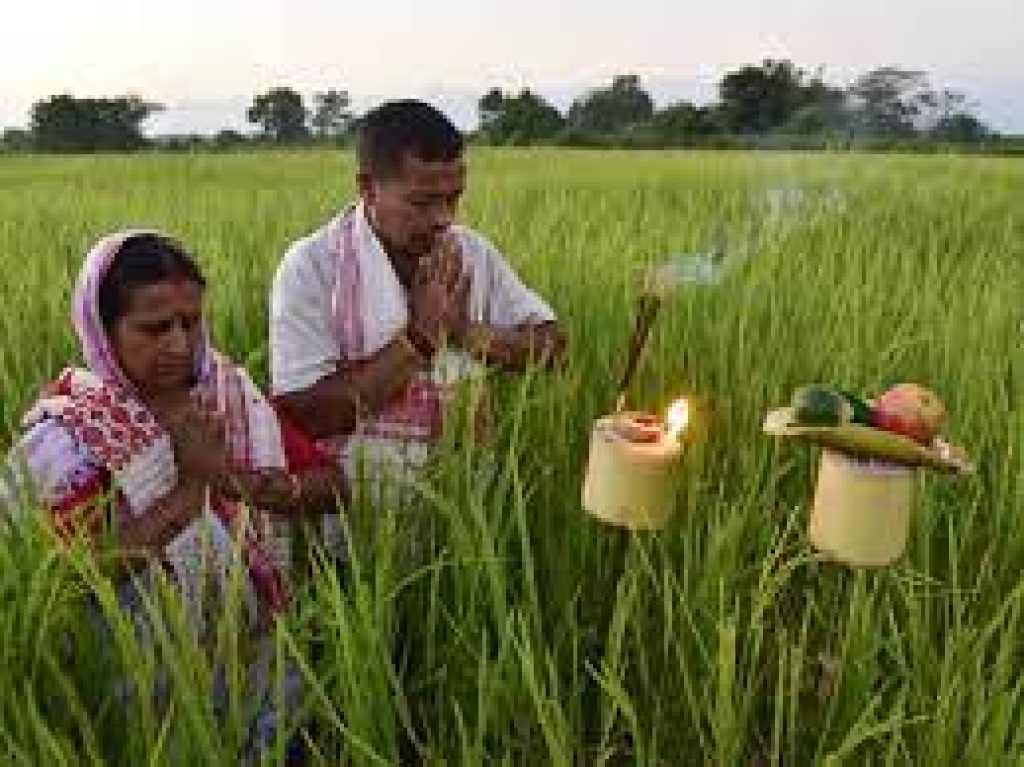Kati Bihu 2023: Date, History, Significance and Celebrations

Kati Bihu, also known as Kongali Bihu, is a significant festival celebrated by the Assamese people in the northeastern state of Assam. It falls on the first day of the ‘Kati’ month, which typically occurs in the middle of October. Kati Bihu 2023 is celebrated on 18th October and it marks the beginning of the rice crop’s growth and the start of the new harvest season. This article explores the history, traditions and significance of Kati Bihu.
Kati Bihu 2023
The festival begins with the washing and placement of a sacred plant, usually Tulsi, on an earthen platform known as “Tulsi Bheti.” Families offer prayers and make offerings to Goddess Tulsi for the well-being of their family and a successful harvest. This practice continues throughout the month of Kati. Lamps and candles illuminate various parts of the home, particularly near the revered Tulsi plant, creating a spiritual ambiance.
History of Kati Bihu
Kati Bihu is solemn festival, primarily focused on the month’s restrictions and remembrance of the past year. It signifies the start of the sowing season in Assam. The empty granaries and growing paddy fields symbolize the scarcity during this time, earning it the nickname “Poor” or “Kongali.”
Significance of Kati Bihu 2023
Kati Bihu is one of the three major festivals in Assam, alongside Bhogali Bihu and Rongali Bihu. It connects people to their agricultural roots and celebrates the importance of the harvest. Lighting traditional lamps and decorating the Tulsi plant with lights and garlands harks back to ancient practices where these lights served as natural pesticides for the fields.
Celebrations of Kati Bihu 2023
- Light a Lamp: Traditional clay lamps are lit in honor of Goddess Tulsi, symbolizing hope, manifestation and family well-being.
- Learn Bihu Dance: Join the celebration by learning Assam’s traditional dance, which is not only cultural enriching but also great exercise.
- Say a Prayer before your meal: Express gratitude for the food on your plate and the farmers who grow it. Kati Bihu revolves around rice harvesting and prayers bless the ground and anticipate a fruitful harvest.
Traditions and Rituals of Bihu Kati Festival
- The Meal Feat: Northern Assam favors duck meat, while pigeon meat is enjoyed in the southern regions on gloomy days.
- The Gamosa Gift: Visitors to Assamese homes are presented with a “gamosa,” a hand-made towel.
- The Tri-Holiday Celebration: Rongali Bihu, Bhogali Bihu and Kati Bihu together make up the trio of Bihu festivals in Assam.
- The Touch of Tulsi: Earthen lamps, known as Saaki, are lit around the revered Tulsi plant, emphasizing its significance.
- The Dance of Persistence: The day concludes with the Assamese traditional dance known as Bihu, symbolizing community unity even in non-celebratory times.